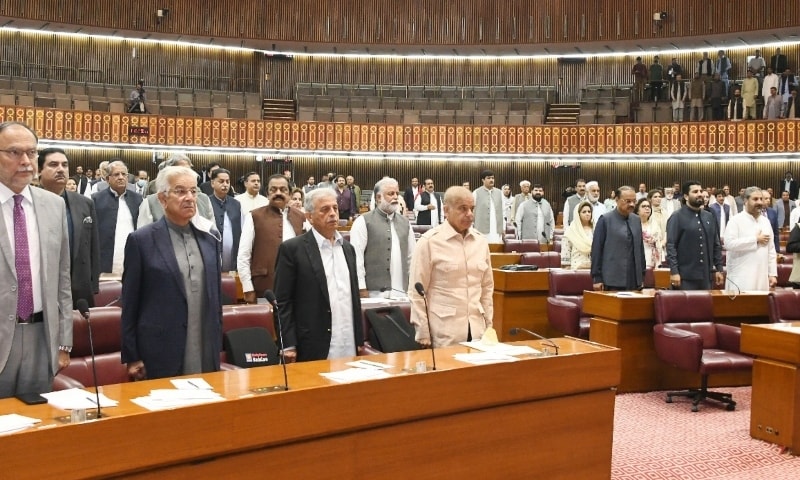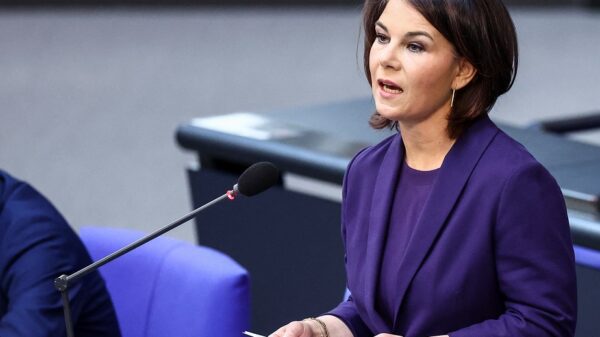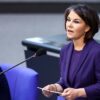ISLAMABAD: The lawmakers in the National Assembly regretted the decision to enter into dialogue with militants and resettle them in the country during the previous PTI regime.
Following a ghastly Peshawar blast in which over hundred people perished, the federal legislature termed negotiations with Taliban a “faulty” move which was “never endorsed” by parliament.
The In-Camera Briefings
Defence Minister Khawaja Asif and Interior Minister Rana Sanaullah referred to the military leadership’s in-camera briefings given to parliamentarians during the tenure of the PTI government, following the fall of Kabul. In their policy statements,
The defence minister said: “A message was given that talks could be held with them [the militants].”
He claimed that the briefings had remained “inconclusive” and they were only informed about the decisions that were already taken and parliament never endorsed them.
Khawaja Asif asked, “How could one expect that those who had never seen peace in their life would live peacefully,”. The house had formally began a debate on the suicide attack.
Decisions were ‘already made’
The incumbent defence minister stated, that “Decisions made some two years ago had not been endorsed by this house. We were only told in those briefings that this decision had [already] been made. Now, who will be held accountable for the bloodshed?” he asked.
“We are all members of parliament. Are we sovereign? We are a mortgaged nation. The decisions are not in the hands of the nation,” he said, stressing: “We must put our house in order. There is a need for introspection. Why these people were brought here [to Pakistan]?” he asked.
In the retrospect
The minister also criticised the decision to become part of the Afghan Jihad in the 1980s, and later, the US-led ‘War on Terror’ post 9/11.
He said: “We ourselves sowed the seeds of terrorism when the Russian troops entered Afghanistan and we provided our services to the US on rent.”
“We were very fond of launching a jihad,” quipped Asif.
He regretted that Pakistan had always acted as a “stooge” for the world powers, but today the country was standing alone in the fight against terrorism.
The 8000 Militants
The interior minister Rana Sanaullah in his address shared with the House that the previous regime told them that there were some 8,000 militants who should be given an opportunity to surrender before the law as some 25,000 family members, including the children, were also associated with them.
While the decision might have been made in good faith but this policy proved wrong, he said while referring to the recent surge in terror attacks.
The minister claimed the PTI government released thousands of the militants from jails, including those who had been sentenced to death.
“There is a need for the prime minister and the military leadership to take this house into confidence. There should be a debate in parliament,” . He asked the lawmakers to suggest a way forward.
He said the military leadership should place facts and figures before the house and added that the prime minister and the army chief would “certainly” come to the house and brief this house which would provide them a “way forward”.
While Peshawar Bleeds
The National Assembly, which met after a two-week recess, also witnessed an emotional speech by MNA from Peshawar, Noor Alam Khan. He protested the absence of the premier and the non-serious attitude of some of Punjab’s MNAs.
“Unless there is bloodshed in Lahore or Punjab, these people will not get serious,” said Mr Khan, pointing towards some backbenchers who were busy chit-chatting.
“I feel that I am a second-rate citizen of Pakistan,” said Mr Khan while referring to an incident where the security personnel did not allow him to enter the Red Zone area in Peshawar without proving his identity.
“Afghans are roaming everywhere and Pakistanis are facing difficulties and are asked to show their identity cards,” he claimed.
Terrorism a collective issue
The interior minister, however, responded to Mr Khan’s speech and said terrorism was a collective issue, which could be rooted out through forging unity and joint efforts. He claimed that in 99 per cent of incidents, the terrorists didn’t belong to Punjab.
The Senate Session: ‘Revisit counter-terrorism policy’
The Peshawar bombing resonated in Senate as well. The lawmakers urged the need to revisit the counter-terrorism and Afghan policies.
PPP leader Raza Rabbani demanded a new consensus as he called out the former government for its plan to rehabilitate the banned TTP. The senator regretted that “good Taliban” had been allowed to cross into Pakistan along with arms.
He said parliament and the nation were not taken into confidence over dialogue with the Tehreek-i-Taliban and the subsequent ceasefire.
Raza Rabbani agreed with his colleagues in NA that parliament had never endorsed talks with the TTP and also raised questions over “outsourcing” the dialogue to a jirga.
Joint-session of the Parliament
About the reports of a joint session of parliament on Feb 8, he demanded that the session be devoted to the counterterrorism policy. He added that a meeting of the Senate’s Committee of the Whole should be held for threadbare discussion on the security situation.
The endorsement
Senator Mushahid Hussain Syed and Senator Tahir Bizenjo also sought revision of policies pertaining to terrorism and Afghanistan.
from The PM Office
In a tweet, PM Shehbaz Sharif said that the militants wanted to “reverse” gains against terrorism. He urged political unity amid the terror wave.
US NSC Spokesperson
Separately, US National Security Council Spokesperson Adrienne Watson termed the increase in Peshawar deaths “tragic and heartbreaking”. The US official reminded all that “terrorism is indefensible, and to target worshippers is unconscionable.”










